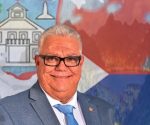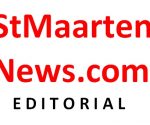Haakmat: corruption in Suriname is homegrown, not the result of its colonial past
![]()
PHILIPSBURG — André Haakmat, the former vice prime minister of Suriname, defends his thesis ‘Corruption and the fight against corruption in Suriname’ next week at the Open University in Heerlen. The conclusion of his research is remarkable and it could have been written about St. Maarten with the same outcome: “The promise of Queen Wilhelmina in 1944 that the colonies would get the authority to handle their own domestic affairs independently has sown the seeds for the corruption-promoting ethnic political system in Suriname.”
Haakmat researched the roots of the widespread corruption in Suriname and checked whether this is the result of the Dutch colonial past or something homegrown.
For the new status of the colonies the Dutch government made it a condition that the new parliament would be a mirror of the whole population. In Suriname this resulted in the formation of ethnic political parties and to a fraudulent political system.
The corruption manifested itself in two fields that were beyond the direct supervision of the Netherlands: issuing land and the civil service. This is Haakmat’s conclusion after historical research from the moment Suriname became a colony of the Netherlands until its independence on November 20, 1975.
Suriname has a policy of ‘family and friends’ for the issuing of land and for the appointment of civil servants; the system favors family members of political allies.
Promises of political parties to put a stop to this form of corruption are not kept; they are, as they say in Suriname, “podium-language.”
The current government of President Santohki is also guilty of this practice. This explains the stubborn and increasingly vocal protests in the country.
To combat political instability in Suriname and to control far-reaching social unrest and violence, an effective fight against corruption, as part of good governance, offers the best guarantees, Haakmat observes.
Such an effective fight against corruption can only come about after a thorough reform of the political and social system.
André Haakmat, born in Suriname in 1939, wrote his thesis as an external PhD student at the law faculty of the Open University. He worked in the Netherlands for the public prosecutor’s office and as an attorney in Amsterdam.
In 1980 he was briefly the vice prime minister in the cabinet Chin A Sen II and he served as the minister of Justice, Army and Police and Foreign Affairs. In 1982 he survived an attempt on his life and returned to the Netherlands where he chaired a Surinamese resistance movement against the military dictatorship of Desi Bouterse. In 1987 he left politics.
For his thesis Haakmat also researched the breeding ground for the wars between drugs gangs in Amsterdam and the question whether Suriname’s 2017 Anti Corruption Law violates the obligation stemming from the OAS-treaty against corruption of 1996 and the VN-treaty against corruption of 2003.
###
Related link: Promotie: Corruptie in Suriname product van eigen bodem, geen erfenis van Nederlands koloniaal verleden























